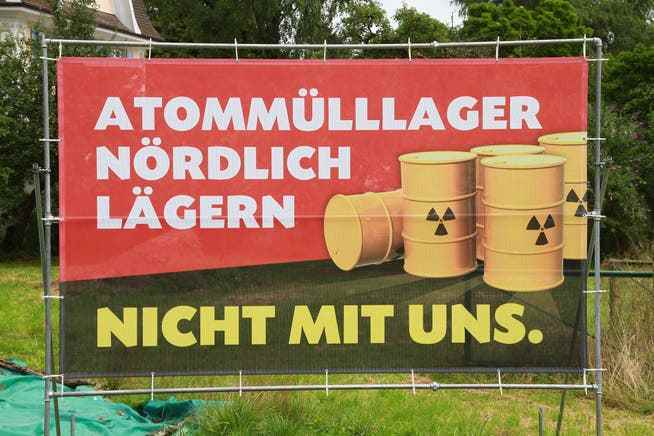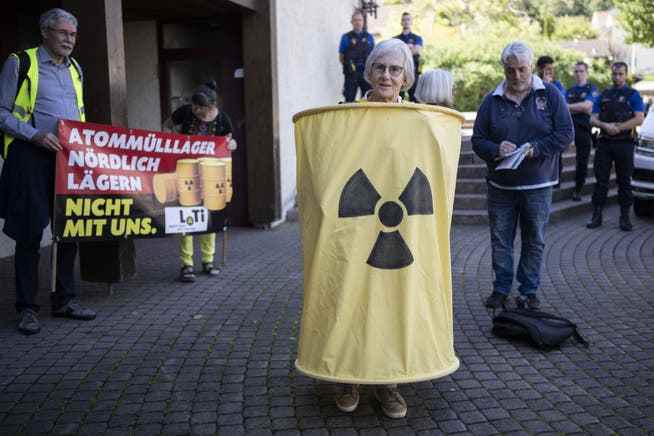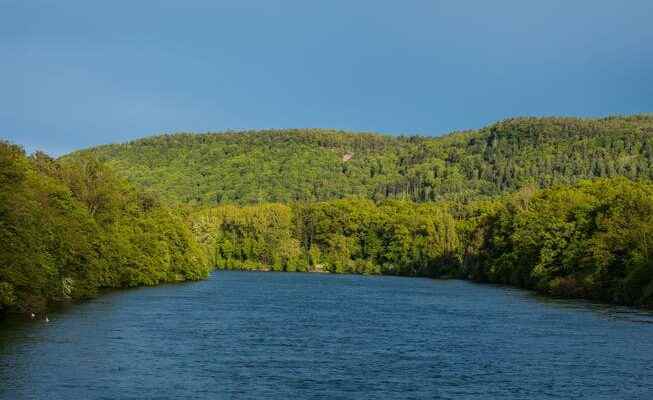Switzerland is planning the nuclear waste repository in the immediate vicinity of the German border. The northern neighbors do not want to carry this burden for nothing.
While it remains surprisingly quiet on the Swiss side of the Rhine, the planned storage facility for radioactive waste on the German side is a topic of conversation.
Proximity harbors the potential for conflict, as anyone who has been annoyed by the neighbor’s grilled sausages or late-night parties knows that. In principle, it is no different when it comes to less everyday stresses such as aircraft noise or nuclear waste. This is illustrated by the reactions to the site decision for the Swiss repository for radioactive waste beyond the national border. As cautious as the resistance in Switzerland is for once, the German neighbors are showing concern.
“We weren’t surprised, but we were extremely surprised because of the history,” says Martin Benz, the mayor of Hohentengen am Rhein, on the phone. Reactions in the region ranged from concern to fear to anger. After Nagra itself had deferred the Nördlich Lägern area in 2015, one expects “conclusive and detailed reasons” for the decision to assess the area as the most suitable.
Martin Kistler, district administrator of the neighboring German district of Waldshut, considers storage in the immediate vicinity of the border to be justified due to the geological conditions, as he said on Monday at a media event in Zurich’s Stadel. “We are ready to share the burden. But the effects of a camp don’t stop at national borders. Our communities make a substantial contribution to solving the Swiss task.”

As early as 2010, the village of Hohentengen opposed the construction of a nuclear waste storage facility.
Stuttgart and Berlin want to take a closer look
The nuclear repository occupies far beyond the neighboring communities. Baden-Württemberg continues to push for the safest location and will demand the best possible security facilities, State Environment Minister Thekla Walker confirmed on Monday. “The protection of our citizens from radioactive radiation must be guaranteed, but in particular the protection of groundwater.”
Both Baden-Württemberg and the German Federal Ministry for Nuclear Safety (BMUV) have announced a “close examination” of the Swiss proposal. Even the Federal Chancellor commented on the location decision on Monday. Olaf Scholz told the German “Tagesschau” that his government would “have to discuss this with the Swiss government”.
The ?? deep storage facility for nuclear waste is now to be located in Nördlich-Läger not far from #Hohentengen in #BaWü to be erected. We will look at the decision @Nagra_Switzerland look very closely. Safety must be the decisive criterion. @BMUV https://t.co/0CvmJcEVm1
— Chris Kuehn (@ChrisKuehn_mdb) September 11, 2022
But the German resistance is not of a fundamental nature. “If the geologically safest location is Nördlich Lägern, we can of course accept that,” said the spokeswoman for the Baden-Württemberg Ministry of the Environment on request. The mayor of Hohentengen, Martin Benz, also agrees. “If there’s one thing we’ve agreed on over the decades, it’s that nuclear waste has to be disposed of, and that has to be done in the safest possible location.”
It is therefore undisputed that the nuclear waste has to be stored somewhere, and that Switzerland can hardly be blamed politically for wanting to move forward. Against the background of the potentially conflictual topic, the Swiss authorities are also trying to disentangle the location decision from politics as far as possible. In the words of Nagra boss Matthias Braun: «Geology has spoken».
Pulling a rope over compensation payments
But simply as a nice neighborly gesture, the German municipalities do not want to take the risk associated with the nuclear waste storage facility. They demand the same status as the affected Swiss cantons and municipalities. In addition to an appropriate say in future planning, there is a particular demand for adequate compensation. Because Switzerland is willing to compensate the affected regions financially for their responsibility.
“When it comes to the issue of compensation, it shouldn’t be decisive whether the car number plate of the affected population bears a ‘D’ or a ‘CH’.”
One wants to be treated fairly and equally, said District Administrator Kistler on Monday in Stadel. Because for him it is clear: “The process can only succeed if the project meets with recognition on both sides of the Rhine.” Thekla Walker is of the same opinion. The affected population in Baden-Württemberg is making a major contribution to the disposal of Swiss nuclear waste, says the Baden-Württemberg Minister for the Environment. It is imperative that this is adequately reflected in the compensation negotiations. Or as a spokeswoman for her ministry puts it: “When it comes to the question of compensation, it shouldn’t be decisive whether the car number plate of the affected population bears a ‹D› or a ‹CH›. It has to be about the concern.”
What distinguishes the nuclear waste from the aircraft noise dispute
In Switzerland, they are now banging on open doors. The municipalities on the German side would be taken into account on this issue, announced the Zurich government councilor Martin Neukom on Monday. For him personally, it is clear: “No matter which canton or country: the compensation should be distributed fairly.”
However, it is not yet clear who will receive how much. Both the amount and the criteria are the subject of negotiations, says Roman Mayer, deputy director of the Swiss Federal Office of Energy. Those responsible are aware that pulling the rope will not be an easy task. “The compensation negotiations will be challenging,” said Monika Stauffer, head of the radioactive waste section at the Federal Office of Energy. The experience of decades of struggling to find a solution to the aircraft noise dispute sends its regards.
However, neither in Stuttgart nor directly on the border are feared that the nuclear waste storage facility could have a similar impact on southern German-Swiss relations as the aircraft noise dispute. Because, according to Mayor Martin Benz, there is one important difference: when it comes to the nuclear waste site, the affected region was involved in the process, “while we still don’t talk to us about air traffic”.

In Switzerland, the resistance is manageable: activists demonstrated on Monday in Zurich’s Stadel against the nuclear repository in the planned Nördlich Lägern site region.
Germany needs its own nuclear waste storage facility
Meanwhile, the idea of storing German nuclear waste in Nördlich Lägern already seems off the table. The BfE Vice Director Roman Mayer gave a clear rejection of such considerations on the sidelines of the Nagra press conference on Monday: “It is an internationally recognized principle that every country must dispose of its own waste.” Just as Switzerland cannot export any material abroad, no other country accepts it.
From the German side there are no efforts in the opposite direction. “Germany has decided to construct its own repository for its nuclear waste and not together with European partners. We are responsible for our waste,” a spokesman for the Federal Environment Ministry told the German Press Agency.
